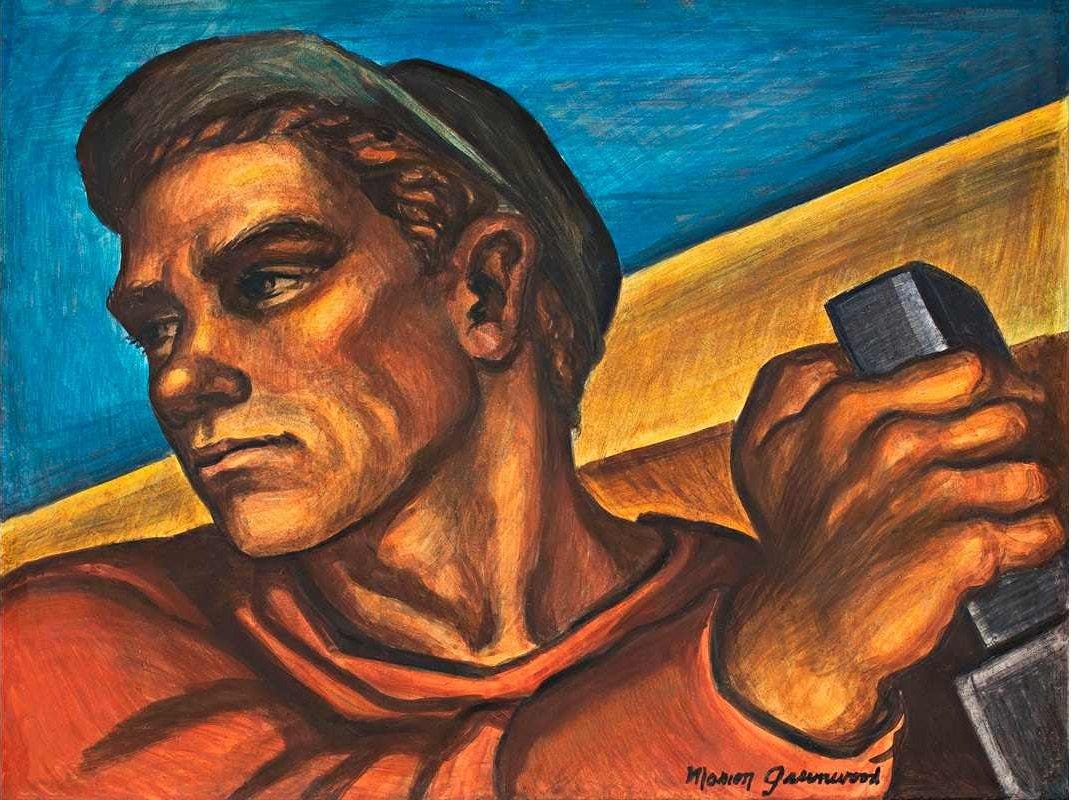In Honor of Essential Workers
In our fourth Labor Day of the Trump presidency, Public Seminar honors those who care for us

Marion Greenwood, Construction Worker, WPA, 1940. Wikimedia Commons.
This is our fourth Labor Day weekend in Trump’s America. In no way, can we say it is a good year for American workers. We plunged from record employment to near Great Depression levels of unemployment within a matter of weeks, as the nation all but shut down in response to the novel coronavirus pandemic. Workers – in warehouses and gig jobs, hospitals and meat packing plants – have been dubbed “essential workers” and “heroes,” and then sent off to work with inadequate protection and less than appreciative pay. Many became ill and some died. In the meantime, Trump’s continued his ongoing assault on everything from worker safety to retirement security.
At Public Seminar, we want to ask you to spend a few moments on this Labor Day weekend revisiting a few pieces we’ve published in the past few months, looking at our past, current reality and (hopeful) future for American workers:
Sharon Block and Benjamin Sachs at Harvard University’s Labor and Worklife Program explain why the economic disaster that has accompanied Covid-19 is “the result of a grievously inadequate and inequitable social safety net and lack of worker protections,” and then outline a plan to fix it.
Peter Dreier asks us to celebrate not just Labor Day, but May Day, a holiday originated in the United States but barely celebrated or noticed here, one that demands “a dramatic rethinking of what the country should do to improve living and working conditions for America’s families.”
Paul Apostolidis looks at the working conditions in American meatpacking plants, where there has been outbreak after outbreak of COVIV-19, and asks up to do better.
Jose Angel Navejas tells us that almost no one is looking out for undocumented laborers during the current crisis. He also notes that the Supreme Court’s decision to block Trump’s attempt to end DACA relief, that doesn’t help the vast majority of the undocumented – including himself. “In practical terms, this means that the lives of over 10 million people currently remain in limbo.”
Finally, Paulo de Santos reminds us that traditional economists undervalue care work, while Alissa Karl reviews at the history of the 1970s Wages for Housework and the 1980s pay equity for female dominated jobs movements, and argues “they not only bolster the case for more wages for essential work, but perhaps even more crucially, they provide us with alternative bases for valuing all labor – especially that which is most necessary for human survival – in the first place.”
I can’t think of a better message to end this post with. Enjoy the holiday, and enjoy the issue.
— Helaine Olen, September 4, 2020
Politics:
Simon Jones, “Scotland Is Stuck: The Scottish National Party is more popular and powerful than ever – but also boxed in to a constitutional stalemate with the UK.” (September 3, 2020)
John Stoehr, “Believing Donald Trump’s Lies is a Choice: How Trump’s blizzard of falsehoods enables white racism.” (August 31, 2020)
Marshall Auerback and James Carden, “The Rotten Alliance of Liberals and Neocons Will Likely Shape U.S. Foreign Policy for Years to Come: Trump’s rise led to unity in the interventionist ranks opposing his foreign policy.” (September 1, 2020)
Plague:
Pat Garofolo, “Enjoy Your Pandemic Waterpark: A corporation deigns to let taxpayers into a previously private park they paid for.” (September 2, 2020)
Sex:
Cassandra Seltman and Danielle Knafo, “Sex with Robots: Digisexuality and the disavowal of the human.” (September 3, 2020)
Post Office:
Laura Goldblatt and Richard Handler, “Do They Deliver for You? Postage stamps and the paradox of democracy.” (September 3, 2020)
Historiography:
Sara Georgini, “What Does a Virtual Conference Look Like? Scholars have been grousing about the expense of annual meetings for years. The pandemic is our opportunity to imagine change.” (September 3, 2020)



